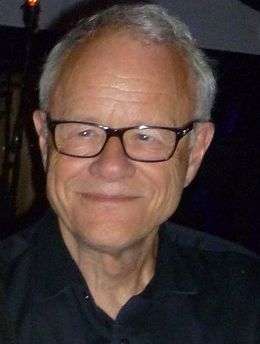Bjørn Kruse
| Bjørn H. Kruse | |
|---|---|
|
Kruse in 2016. | |
| Background information | |
| Birth name | Bjørn Howard Kruse |
| Born |
14 August 1946 London, England |
| Origin | Norway |
| Genres | Contemporary music, jazz |
| Occupation(s) | Composer, musician |
| Instruments | Saxophone |
| Website |
bjornkruse |
Bjørn Howard Kruse (born 14 August 1946 in London, England) is a Norwegian painter[1] and contemporary composer. He is also professor of composition at the Norwegian Academy of Music in Oslo.[2]
Personal life
Kruse is the son of Colonel Erling O. Kruse (born 1922) and Eunice Cooklin (born 1925, died 2014), and spent his childhood in England and the USA. In 1974 he married Professor Gro Shetelig (born 1948) and they got three girls, singers and actors Benedikte (born 1979), Anine (born 1977) and Jannike Kruse (born 1975). Marriage dissolved 2008.[3] Married Karette Stensæth 2012. Kruse has a broad background as a musician, (clarinet and saxophone),[1] producer and music arranger.[3]
Academic career
Ever since his student days he has given lectures at Norwegian Academy of Music, in jazz theory and author of Bruksmusikkarrangering (1978)[4] but foremost in composition, and music and arts ethics.
Bjørn Kruse is a lecturer within his academic area,[2][5] often based on his book Den Tenkende Kunstner ("The Reflective Artist").[6] [note 1]
Artistic career
As a composer, he has created more than 150 titles in the genres of chamber music, choral music, larger orchestral works and operas.[7]
In the dance project Memento Mori young and old are joined together in a theatrical tapestry of dance movement, text, voice, music and sound. Kruse and the choreographer Sølvi Edvardsen wanted in this piece to focus on all stages of life.[8][9]
His latest major work was the opera The Green Knight with libretto by Paal-Helge Haugen. It premiered in Kristiansand, Norway, on 10 March 2004.[1]
Kruse formed the vocal group Bendik Singers with his brother Philip Kruse and the singers Anne-Karine Strøm and Ellen Nikolaysen.
Selected exhibitions
His latest major exhibitions of paintings were both at the gallery Albin Upp in Oslo:
Selected recordings
- As musician
- 1991: Service for the Nervous – Please Continue Singing (Norway Music Hemera), trio with Warren Carlslstrom & Celio De Carvalho
- 1991: In the hall of the mountain king (Crema) The Norwegian Big Band (Radiostorbandet – NRK)
- As composer
- 1988: Voices – Le voci di sempre
- 1993: Cikada – Syntax
- 1994: The Operamusical – Adam (Norway Music Hemera)
- 1995: Bendik Hofset – Concerto for Saxophone (Aurora Records), album: Orchestral adventures
- 1999: Works for Choir – Song For Winter (Aurora Records)
- 1999: Concentus – På evighetens tavler (Female choir)
- 2016: Portrait With Hidden Face (LabLabel), Eir Inderhaug with Ellen Margrete Flesjø, Ingfrid Breie Nyhus, Gjertrud Pedersen, Ellen Sejersted Bødtker, Eirik Raude, Marianne E. Andersen
Bibliography
- Bruksmusikkarrangering 1978[11]
- JAZZTEORI – Grunnleggende prinsipper 1980[4]
- Den tenkende kunstner. Komposisjon og dramaturgi som prosess og metode 1995[1][6]
Notes
References
- 1 2 3 4 5 6 "Bjørn Kruse – MIC Biography".
- 1 2 "Bjørn Howard Kruse – NMH".
- 1 2 Nedland, Sigbjørn. "Bjørn Kruse". In Helle, Knut. Norsk biografisk leksikon (in Norwegian). Oslo: Kunnskapsforlaget. Retrieved 23 June 2012.
- 1 2 Kruse, Bjørn H. (1980). JAZZTEORI – Grunnleggende prinsipper (in Norwegian). Oslo, Norway: Frost Music AS. ISBN 82-90560-22-2.
- ↑ Kruse, Bjørn H. (2009). "Improvisation as a dialogical model in the creative thought process". Alveiro, Portugal: Presentation at the IASK conference "Teaching and Learning", 26 May 2009.
- 1 2 "kruse (1995)".
- ↑ "Bjørn Kruse – Norsk Musikforlag".
- ↑ "Memento Mori – Ballade (In norwegian)".
- ↑ "Memento Mori – presented by violinist Stig Nilsson" (PDF).
- ↑ "Artist Bjørn Kruse – Saatchi Online".
- ↑ Kruse, Bjørn H. (1978). Bruksmusikkarrangering (in Norwegian). Oslo, Norway: Norsk Musikkforlag. ISBN 978-82-00-01246-7.
| Wikimedia Commons has media related to Bjørn Kruse. |

